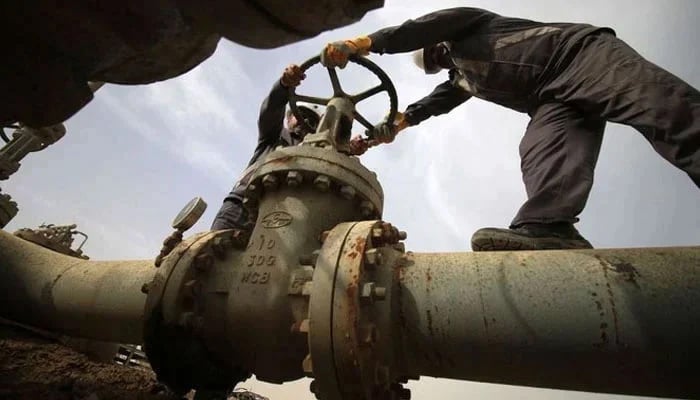As per a USAID study, more than 3,000 TCF shale gas resources exist in various shale horizons of Pakistan  Two employees work on a gas pipeline. — AFP/File
Two employees work on a gas pipeline. — AFP/File
ISLAMABAD: Amid declining natural gas production by 8-9 percent annually, the country has found promising indications of the presence of heavy reservoirs of shale gas at the pilot well KUC-1, Hyderabad, Sindh. The project was initiated by the Oil and Gas Development Company Limited (OGDCL) in 2020.
As per a USAID study, more than 3,000 TCF (trillion cubic feet) shale gas resources exist in various shale horizons of Pakistan.
“We have vertically dug the well and discovered two layers of rocks containing shale gas and OGDCL experts will further vertically drill up to the third layer in the first week of next month. The data collected and analyzed after fracking the first two layers showed the presence of shale gas in abundance. After reaching and fracking the third layer, the process of digging the same well horizontally up to 1,500-2,000 meters within a depth of 3,000-6,000 meters would be undertaken,” Dr M Saeed Khan Jadoon, adviser to OGDCL on exploration of oil and gas and head of shale gas cell, told The News.
For fracking the vertical and horizontal layers, OGDCL has already signed an agreement with Schlumberger, Pakistan.
Jadoon said OGDCL has increased its focus on capacity upgradation of human resources in the shale gas cell and, in this regard, it has sent its members to China and the USA to keep them updated with the current ongoing developments in the discovery of shale gas techniques. Like the USA, China is also massively investing in exploring shale gas.
“After three months, we will initiate the horizontal drilling in the pilot well, which may be completed by August next year 2024,” he added.
To a question, the official said that the total process of drilling the well vertically and horizontally would be completed in 3-4 years at the cost of $25 million to $30 million as COVID-19 virus and floods had caused the delay. After that, OGDCL will market the well to investors, keeping in view data to be collected after fracking the layers vertically and horizontally about the presence of shale gas. The investors will utilize their financial resources to discover shale gas commercially.
Dr Jadoon said that recovering the shale gas on a commercial basis was highly capital intensive and the cost of discovering such unconventional gas would cost $10-15 per mmBtu. OGDCL, being a national oil company, is pursuing this difficult task to pave the way for investors by providing them with actual production potential of the shale gas reservoirs in Pakistan. After this successful pilot well, all the data relating to drilling, completion, fracking and production will be collected and analyzed for future exploration strategy of shale gas in Pakistan. The success of this pilot well may trigger the company to drill a few more pilot wells to ascertain the frack-ability and productivity of the shale gas in a region.
Sember Shale is considered as the richest source rock having good thickness, mainly found in the lower and middle Indus basin of Pakistan. Presently, OGDCL is producing about 35,000 bbl/day oil and 800 MMSCFD gas and is contributing about 47 percent in oil and 30 percent in gas production.
This indigenous production of oil and gas has resulted in saving of about $4 billion and the contribution to the exchequer is about Rs280 billion this year. The company is also providing significant employment and business opportunities to the people of Pakistan. OGDCL has also set up the procedure for the use of local products without compromising the quality. Though Pakistan is producing about 70,000 bbl/day oil and about 3.249 MMSCFD gas, the quantity is not enough to meet the demand. The country has to import oil and gas to plug the demand and supply gap.







